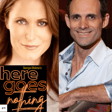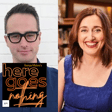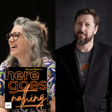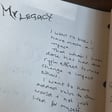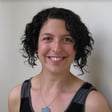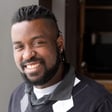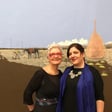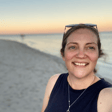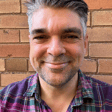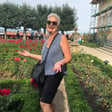Become a Creator today!Start creating today - Share your story with the world!
Start for free
00:00:00
00:00:01

Season 2, Episode 3: Diversity in Storytelling with Caroline Wood with Guest Interviewer Sisonke Msimang
Stories bring us together, show us where we’ve been, and link us with people from a wide diversity of backgrounds in ways we might not have expected. Join Caroline Wood and guest interviewer Sisonke Msimang for a lively discussion of the importance of storytelling, the impact of Australia’s growing diversity, and learn how to identify what a good story sounds like, as cultivated in Perth’s beloved Centre for Stories.
Transcript
Introduction to Storytelling's Power
00:00:07
Speaker
Stories have the power to bring us together, to understand our pasts and to unite us for the future. Regardless of where we come from but the culture we grew up in, storytelling remains one of the most ancient forms of human community building, back to pre-literate oral cultures and one which still proves vital today in our increasingly diverse society.
Meet Caroline Wood and Sisonke M'simung
00:00:29
Speaker
On this month's episode of Georgia Malone's Here Goes Nothing, we meet Caroline Wood, i AM, founder of the Margaret River Press, the Australian Short Story Festival, and Perth's beloved Centre for Stories.
00:00:42
Speaker
Joining Caroline is the brilliant Sisonke M'simung, internationally renowned author, speaker and advocate, who leads a spirited discussion on the role of stories in our lives, the importance of good food, and how sharing our experiences is the best possible way to understand one another.
The Collaborative Journey in African Storytelling
00:01:01
Speaker
Enjoy the conversation.
00:01:07
Speaker
I'm Caroline Wood, im co-founder and CEO of the Centre for Stories. um And I've worked alongside Sisonke for many years and we've developed quite a good rapport and I hope, you know, the conversation tonight will be of great interest.
00:01:25
Speaker
Hi, I'm Sisonke and I've been working with Caroline pretty much since the day I arrived in Western Australia. um And yeah, I'm looking forward to this conversation as well.
00:01:35
Speaker
So Caroline, i remember very distinctly walking into the office at the Center for Stories. um Yeah, about a decade ago, um you had invited me to participate in some initial ideas around some African storytelling. It was a ah book project at the time.
00:01:56
Speaker
And um I walked into the center and it looked very different from the way that it does today. um it hadn't had its fancy renovation, and um it would but it still had the same feeling and warmth and depth.
00:02:13
Speaker
And so I guess that's where I wanted for us to begin our conversation because from almost day one, it felt like you had a real clear vision and a sense of what the story, the center for stories was going to look like and feel like for people.
Caroline's Vision for Perth's Art Scene
00:02:31
Speaker
I'm glad that you think I had a vision because many people have asked me what my vision was and what my strategic plan was. I remember,
00:02:45
Speaker
Wendy Martin asking me this when she started Cannes. I think a lot of people are a bit surprised that I really didn't have a strategic plan.
00:02:57
Speaker
I think I had ah strong sense of what was required and what was missing in the art scene in Perth, but particularly in the publishing sector, not just in Western Australia, but across Australia.
00:03:14
Speaker
And ah just... felt that we needed a space that was inclusive and safe for people to come to. um My very first um manager, ah Ada Chung, would probably express a lot of frustration if you had a conversation with her in the early years because she came from the ABC where you know You had a strategic plan and you had operational plans.
00:03:44
Speaker
And I just kept saying to her, let's just go with the flow and see what happens. um you know This is a journey. It's an exciting journey. And we will get to a point where we know what we want the centre to be and what it would look like. And I think that has basically um happened in the sense that in the first few years, we just, well, John and I had to bankroll it. So we had to just grab anything that came our way, whether it was $500 project or
00:04:20
Speaker
$5,000 project. It was just making sure we had some runs on the board. um And I remember that um project very well, Sasaki, that
Mentoring Success and Cultural Narratives
00:04:30
Speaker
you're talking about. It was for Africa Day and it was our very first mentoring program, which was um mentoring ah writers of African heritage and be mentored for writers.
00:04:46
Speaker
And actually that project for the amount of money and for how small it was, it's just made such a huge impact. um All those writers have won awards, right? All of them have won awards and gone on to do these amazing things.
00:05:02
Speaker
Yeah. And all have been published. In fact, this year, um the Hungerford Award ah book will be coming out and that was awarded last year to Jürger Waldes, who was one of the participants in the project. So he won the Hungerford last year.
00:05:21
Speaker
And the great thing is that book is coming out in both Amaric and English. the you know I haven't seen it yet, but I'm really excited to see um how that will be received because...
00:05:34
Speaker
for the Ethiopian community, it would be absolutely fantastic to see some of their language in in a book published by Fremantle Press. So I remember can remember that. I remember that story actually.
00:05:47
Speaker
ah remember Yerga's story in particular. And I remember being struck by how that story was about a fictional character And I don't think Yerga would mind us saying that that fictional character was really him.
00:06:01
Speaker
It was a fictionalized account of his time working at UWA as a security guard. Yeah. i think it might be the curtain. Yeah. Anyway. i heard That's right. And, um, and what was fascinating about that story was that for me as, um, someone who had just arrived in WA and was looking for a sense of community,
00:06:22
Speaker
um the fact that there was this piece of writing that was like really beautiful, really evocative written by someone who was um about to complete his PhD about the experience of being a security guard and being seen through like one set of eyes of people who saw him as quote unquote, just someone who patrolled.
00:06:43
Speaker
And yet at the same time had all these huge ambitions and this, you know, big dreams for himself that were beginning to come true that, I remember being struck by that story and just feeling like, ah, there are people here who I can really relate to, which is my segue into talking about a little bit of reversing
Caroline's Multicultural Roots
00:07:03
Speaker
a bit. So we started with the center and that in some ways is like, um feels like what you have been working your your way towards building for a very long time, even before you had conceptualized the center. And I guess I'm super interested in your journey
00:07:22
Speaker
with the arts. And, and even before that, part of what I remember so clearly about walking into the center at that time, before there was a strategic plan, before there was a vision was the feeling, right?
00:07:35
Speaker
And so I want to ask you about where that feeling comes from. um And I'm leading you in the way that I'm asking it, because I think that it's very much rooted in your upbringing and the kind of multicultural environment in which you grew up.
00:07:53
Speaker
And so maybe you can say something to us about your first encounter with what arts and culture and all of that kind of stuff meant meant for you growing up in Singapore. So I grew up in Singapore and I come from a very large family.
00:08:07
Speaker
There are nine of us, eight girls and one boy. um And I think um the arts... was ever present in our household, although it was a very Anglophile colonial form of art. My father my parents migrated from India um and my grandmother, my dad's mother was a violinist um and he had um cousins who were musicians And my dad, you know, we grew up in a household listening to Sinatra,
00:08:45
Speaker
Sammy Davis, Beethoven, ah and very little kind of Indian music. um You know, that's a very broad term. There's no such thing as Indian music, but music from India.
00:08:59
Speaker
um And um also just surrounded by multiculturalism meant that people actually, the arts was everywhere. you It just was lived on the streets. So,
00:09:16
Speaker
We used to have what was called wayang, which is um Chinese opera, street opera, and they would just set up stages, you know, platforms made from wood in any vacant spot in a village or, um you know, down a ah street corner or something. And unfortunately, it used to go through very out early hours of the morning, which meant that when it was on at certain times, it was there was a season, you would just wish that they would shut it down earlier. but So that was all around. You know Malay weddings...
00:09:59
Speaker
People used to just walk on the streets in processions with a dance and song accompanying them. And even Chinese funerals were kind of a performative thing as well. The wealthier you are, the more music you had, um the more dancing you had, and the more noise you made. So ah for me, the arts was not just simply located in theater, it was just, you know, we were surrounded. And I also, like I said, grew up in a household where it lots of music.
00:10:34
Speaker
um And my father, you know, with his background kind of had all, number of us learn and a musical instrument. And so on- Well, surely you were like, you were enough of you to like create an orchestra.
00:10:49
Speaker
ah Exactly. But not everyone learned, I guess having nine kids, they couldn't afford to send all of us to music. So out of the nine, ah four of us actually took up an instrument.
00:11:03
Speaker
And you know we used to have a Sunday roast, which was a thing prop that you did in the colonies when you worked for British. And ah we used to have relatives come over and we always had like a concert. My older sisters, two of them played the violin and one played the piano. And it was expected by my father and those visiting that they would put on a little performance.
00:11:30
Speaker
um So I think, you know, the arts was very much, but as was food, actually, the two came together. um And then, you know, growing up in the colonies, of course, lit English literature was a big thing in school.
00:11:46
Speaker
That's right. And as was religious education, I think that's just a different form of literature at the end of the day. absolutely Absolutely. It sure is. The Bible is certainly its own literature and has given rise to to lots of other fictions.
00:12:04
Speaker
ah Yes, that's right. So, um yeah, to answer your question, I think the growing up in multicultural Singapore, being surrounded by all different cultures did have an influence, maybe not consciously, but I think the fact that I grew up in such a diverse community actually has has definitely informed me.
00:12:28
Speaker
And then and then you came to...
Culture Shock: Singapore to Australia
00:12:30
Speaker
Australia. And you were 19 when you got here? I was 21. 21. Okay. Yeah. So you get here at 21.
00:12:40
Speaker
And is it culture shock? Is it like complete and absolute culture shock? I won't say anything about the egg sandwiches. Definitely a culture shock. definitely a culture shop I mean, I left school when i was much to my but particularly my mother was very distraught about that because she expected all her daughters to go to university. But, you know, being the youngest, I was a bit wayward.
00:13:08
Speaker
um ah So I left school at 16. I went secretarial college, worked for three years and then migrated to Australia. um And i went to night school, actually, ah up at Perth Mod.
00:13:24
Speaker
I did English literature and English um as my two matriculation subjects. one But... um What was interesting was, you know, it was just a completely different world. I mean, I wanted a change from the hustle and bustle and stress of living in a city like Singapore where, you know, you traveled an hour and a half to get to work.
00:13:50
Speaker
And boy, did I get that change because I came to Australia. So it was the 1970s when you got here? Because I got here in the...
00:14:01
Speaker
My first trip to Perth was in the and late 1990s and that felt like culture shock. back then in terms of just not a lot of people of color, very sleepy, sleepy. It was like the sleepiest place I'd ever been that also called itself a city. So I sleepy, I can do cause you know, my family, you know my father's from a village, you know, my mother was from Swaziland. So we, I understand sleepy.
00:14:30
Speaker
I just don't understand sleepy and city at the same time.
00:14:36
Speaker
That was the part about Perth that got me. I can't even imagine the 70s.
00:14:42
Speaker
Well, what was interesting, I mean, I had a sister who was already living here and she used to live in Suwiako. And I guess their form of culture was coming together like on a Friday.
00:14:55
Speaker
um and you know, they were heavily into philosophy and they would sit around in a circle and discuss like the meaning of life, which for me was completely different.
00:15:07
Speaker
complete bullshit coming from a very practical sense and practical family. it was like, what are these people talking about? And then coming from Singapore, this was the other horrific part, was they would all be smoking dope and or eating hash cookies. And I was like, what is happening here, you know?
00:15:26
Speaker
um and So it was kind of it was interesting in the sense that, you know, it was a whole, it was an eye-opener in a way of, you know,
00:15:37
Speaker
how people lived and how conversations happened, but also ah just some of the basic things like, you know, there was only one shop where you could get any any produce so that you needed for your Asian cooking, you know.
00:15:53
Speaker
um But what it also gave me ah was a sense of um opportunity and being able to be yourself because there wasn't... I was going to ask about a sense of freedom. Any cultural like like expectations, like, but yeah you know, growing up in Singapore from a migrant family, you know, Indian heritage, other people who came from the same village as you're um as your parents, you know, they were really a bunch of busybodies. They wanted to know what everyone was doing. And, you know, there was a lot of gossiping about family. So it was nice to get away from all that. yeah um
00:16:32
Speaker
But also, I think one of my first experiences of live theatre was when I came to Perth. And what was it? Do you remember what that was? Oh, my goodness. I think it might have been Death of a Salesman in a little theater that was down a lane opposite his majesty, opposite government house. It no longer exists, but i I remember going there. And then I also remember going to the ballet with Rudolf Nureyev was the lead dancer.
00:17:06
Speaker
Wow. Yeah, i i you know in that sense, I was able to experience some of those because I was earning enough and I could go to the theatre and I had that sense of independence.
00:17:20
Speaker
um But a long way from reading Enid Blyton as a child, um you know, the famous five and the secret seven and all that sort of stuff.
00:17:33
Speaker
I know she's cancelled now. Who is Nancy Drew? My grandchildren still read her. Is she cancelled now? Yeah, apparently. Is she cancelled now? What did she do? Yeah. I don't know. It was about the gollywogs and all sorts of things in some of her books.
00:17:48
Speaker
Oh, I forgot about that. All right. So you're going to the theater and you're living your best life as a young 20s woman having just moved to to Perth. And there is this real sense of freedom. And also the 70s are like a super interesting time politically in this country, right? Because when does Gough Whitlam come into power?
00:18:08
Speaker
power um i I don't know when he comes into power, but I think I got in as a result of him be a because there we go no of the kind of white Australia policy and they needed young women to be coming in.
00:18:25
Speaker
Not that I was going to go off and marry a farmer or anything, but I think he's...
00:18:33
Speaker
um So, yes, so it was also my first experience of being able to be politically active and engaged and because after the second of Gough Whitlam, um you know, there was such outrage that I was out there handing out and doing um leaf drops for Tagni, the seat of Tagni, which,
00:19:01
Speaker
was John Dawkins' Old See. And I had never been able to do that before in Singapore because, you know, it's not exactly a democratic country. um So that was, yeah, so that was an interesting time just to to actually see democracy in action. In action. I mean, that's one of the things that's so amazing. I think, too, Rock Whitlam was that democratic. But...
00:19:26
Speaker
Yeah, no, it was an interesting time. Yes, yeah. And that's one of the things that's so amazing about um living in Australia, you know, is that um there is a very local sense of politics and that it is, you know, the things that people care about if they want to do something about it in ways that I think in many of the countries where we grew up, um you want to do something about it, you can't, right? There are like real restraints and constraints on your freedom.
00:19:54
Speaker
and actually here, yep um you have absolute possibilities of what you can shift and what you can change if you um if you decide to do something about it. so So then there's this thread, right? There's this like young woman who's come here and you are both becoming much more, um you're curious about the world and you're interested in the arts, but also politically engaged.
00:20:19
Speaker
And then like this, tall, fair, redhead, handsome stranger knocks you off your feet and makes sure that like Australia will never lose you. Right.
00:20:35
Speaker
So tell tell me a little bit about, about John Wood and, and how
Love Across Cultures: Caroline and John Wood
00:20:40
Speaker
you two. Actually, um, the there's a, it's quite interesting. There's also a little bit of a connection like with Ada. So John Wood did knock me off my feet with his enthusiasm, but he himself will tell you that no woman no woman has ever asked him out, and I did.
00:21:00
Speaker
Oh, my God, I love I can come from a culture where women never do that. So I think it was the feminist the feminist mother I had.
00:21:11
Speaker
um So, yes, I asked John out, and John still tells everybody to this day that no woman had ever asked him out. So I asked John out, and we went out. And then actually a few months later, John got a scholarship and went off to Oxford.
00:21:29
Speaker
um and he ah rang me from a telephone booth on his way to Oxford from a telephone booth in Hong Kong and said, would i would be would I marry him? And I said, yes, of course. So I went went to Oxford and that's where um is that what you're telling me he was on his way you know and so anyway um so i joined him later um and he was on his way you know um and so anyway
00:22:01
Speaker
um so i joined him later um and we got married in Oxford and I actually started a degree in art history and psychology at what's now known as the Oxford Brookes University.
00:22:18
Speaker
And that was really fun, a wonderful entry into art history, which I had not done before, but also to have Europe at your doorstep. So, um you know, each term we would study, you know, maybe the Impressionist or, um you know, Expressionism, and then we would be able to go to the art galleries in Europe and actually see it all.
00:22:46
Speaker
That's incredible. It was incredible. But also the other thing about being in Oxford, it was only an hour to to London. So on a Sunday, i mean, a lot of our English friends found this, ah that thought we were crazy. We would just drive down to London, have lunch, go see a play, live theatre, and then drive back.
00:23:10
Speaker
And for them, that would that would be like a ah weekend, you know. Who who would just drive to London for the day and come back? Australians used to long distances. Exactly.
00:23:22
Speaker
An hour was nothing. um And the other thing as well we used to do a lot of when we were in Oxford was, um you know, the college John was in at Oxford University had these social clubs.
00:23:36
Speaker
that used to organize ah cultural events and activities. And so we used to go to Stratford upon a Avon every few weeks or to see ah to see Shakespeare live.
00:23:50
Speaker
And that was absolutely brilliant because, you know, growing up in Singapore, it was... ah an English education system. And we we did Shakespeare all through school.
00:24:05
Speaker
So there were lots of plays that, you know, mean, I got a distinction in English literature. Once upon a time, I used to be able to recite Shakespeare. But of course, as age comes on, you know, you forget all of this stuff.
00:24:21
Speaker
I know. I don't think I can ever claim that I could recite it. So that was another journey into the arts. Yeah. I was just going to say, no, I don't think I could ever claim that I was able to recite Shakespeare, but I definitely completely relate to the colonial education because having grown up in Kenya in the...
00:24:41
Speaker
a different, a different colony, but nonetheless, um, affected by the the British. Um, we also had to learn all the poems and we had to recite. And so that, that kind of memory, that cultural memory is there.
00:24:55
Speaker
And I guess that's where I wanted to go next if we fast forward a little bit, so then you and John get married and life is lived and you have kids and you're doing all this super interesting work that is kind of university,
Melbourne's Literary Influence on Caroline
00:25:09
Speaker
social justice. You are, you know, on the board of amnesty, all of this stuff happens. And then we fast forward. And one day you're in Sydney and you're walking around and you see, um, the story factory, right? Is that, is that the, is that the lore?
00:25:24
Speaker
no actually, um, it more that, i will I had a small publishing company, Margaret River Press, and I am on the board of the Small Press Network, and so I go to Melbourne.
00:25:41
Speaker
i ah a fair bit for the board meetings. And of course, Melbourne has this kind of vibrancy in the in the city, ah because of partly because of the Wheeler Center, but also the Victorian Library um that is a beautiful space um for activity and engagement ah readings and people using that space for writing.
00:26:08
Speaker
So yes, so I go to Melbourne and I see how um you know vibrant the city is, beautiful bookshops all around. And I think to myself, well, it'd be lovely to be able to do something like this in Perth.
00:26:25
Speaker
But um I'm also informed or motivated by the fact that when I... hey had Margaret River Press, which was a small publishing company, a lot of the submissions and work I was getting was not really reflective of ah the composition of contemporary Australia. So I figured there was obviously a barrier to entry.
00:26:50
Speaker
in the publishing sector that, you know, it's like this mystery and there are gatekeepers and only ah certain people who know how what the process is like are allowed to enter it. So I suppose with that and the what I saw happening in Melbourne was a big motivation for me and John to think of starting up something in the city.
00:27:18
Speaker
Yeah. So this love of of art history and then this, the initial study that you did around English and English literature that, you know, when you first got to Australia, this, this stays with you. So are you a big reader, Caroline? Oh, you know, since the, the,
00:27:36
Speaker
The irony of it all is the last five years, it's been much harder for me to find the time to read. um I seem to spend all my waking hours was writing grants at the moment. But yes, i hi I was. I still love literature and I still try and read as much as possible.
00:27:58
Speaker
um But yeah, I mean, my family, I have a family of readers. yeah We all did English literature. We all excelled at it. um You know, i have a ah sister who is a writer who's based in Singapore.
00:28:15
Speaker
A lot of her work is around activism, so she's written a lot about that. um So, yeah, we we do try and keep reading, yeah. And, and of course, a son who's who's got a PhD in... In poetry.
00:28:30
Speaker
Yeah, in poetry. and Yeah, and then a daughter who's... ah A curator. Curator. So you stamped your, you stamped your artistic sensibility on these children of yours. Yeah.
00:28:42
Speaker
Which I would have to say came from my father. Really at the end of the day, I have to give my dad credit for instilling that in all of us. Yeah. Yeah.
00:28:53
Speaker
And so tell me a little bit about some of the stories then that you have always been drawn to. Like, What, yeah, what is the nature of the stories that kind of captivated you either as a reader when you were growing up, um, or as you were beginning as an adult to think, uh, more critically and more deeply about what stories meant?
00:29:21
Speaker
um So, you know, I think the stories as a child growing up, it was really escapism, pure escapism, um you know, like the Secret Five and... Yeah, okay, so you're Enid Blyton and all that stuff. Enid Blyton, that's just pure escapism.
00:29:40
Speaker
yeah um But I think as I got older, um you know, reading more widely, know, has enabled me to think more broadly about the world.
00:29:55
Speaker
um And I do love reading um literature that um that challenges, I guess, some of the the stated norms.
00:30:12
Speaker
And I recently um finished reading the book
00:30:20
Speaker
Talies People as well, which is about, which is a nonfiction, but, you know, um it's all about ah Facebook and the exploitative nature of it.
00:30:33
Speaker
I'm listening, ah kind of, at the moment, I'm listening to a lot of stuff around Facebook you know what technology has done to people. So I'm very much interested in the different ways in which ah cultures have been robbed and um how people have been exploited.
00:30:58
Speaker
um So I'm listening currently to a book called the Empire of ai and it kind of tells me that the whole thing about colonialism and empires has never left.
00:31:12
Speaker
ah They all show up in a different way. yeah um And
00:31:19
Speaker
the center to me gives me an opportunity maybe of to kind of allow people to talk about the things that matter in their their lives, the little things that are important, the family connections, the connections to food, the connections to um you know their country. So i I think that is what, at the end of the day, really drives me um to keep doing what we're doing because i think those personal connections
00:31:58
Speaker
um matter um to how the world operates in at one level. There's that higher level of the exploitation and the dominance, but then um you know at a much smaller granular level, it's those relationships and the connections that really can't count and matter.
Empowering Diverse Storytelling at the Centre
00:32:20
Speaker
um Can you say something um about Why stories rather than books? You Margaret River Press. You're clearly committed to books. You're clearly committed to literature.
00:32:32
Speaker
Why not a center that focused on books? what what And what's the difference between the kind of definition that the Center for Stories is interested in around stories versus books? Well, I mean, the hope is that some of the stories will end up as books.
00:32:48
Speaker
yeah um And we have done that. We have continued to to publish anthologies and collections of poetry. um But like you say, that's not the main business.
00:33:01
Speaker
The main business is teaching people the craft of storytelling. And I think that's really important because there are certain standards in terms of what, if you want to get something published and for for that standard to be attained, people who want to end up being published authors need to learn the craft.
00:33:25
Speaker
And I think that um there were not many places where people from diverse backgrounds could come and actually learn that craft. So for me, that's a very basic thing um to start at is teaching ah what a good story sounds like, you know, how you should write, what a writing practice looks like.
00:33:48
Speaker
And once you've developed that in a person, then, they could end up being a published author like we've seen. i just feel that I don't need to be publishing those books, but I'd like to be able to be like the incubator, the enabler of those stories to go out into the world.
00:34:10
Speaker
And one of the things that I love about the center is the extent to which the stories that people tell um make them feel good about themselves, even when they're hard stories to tell, even when they're difficult issues.
00:34:28
Speaker
um There is something about sharing a story that has a little bit of magic yeah um contained in it. um Yeah. And that's the art part. um And since this is a podcast about, um you know, about the arts, I'd love to get your reflections on some of the stories that you've heard over the last decade that feel like they really sit at the center of that place that is art, that is, that has a kind of performative,
00:35:02
Speaker
magic to it that is also deeply meaningful and like really beautifully felt. Yeah.
Overcoming Racism: Colin's Soccer Story
00:35:09
Speaker
I also think what's really important that we do at the center is while the craft and the art of storytelling is really important, but equally important or more important is the care for the storyteller.
00:35:25
Speaker
So we've always but worked on the basis that if you care for the storyteller, you will get the best story out of them. So I think that that's a really important distinction in terms of how we operate at the centre.
00:35:41
Speaker
yeah um and And I guess the evidence is there in the sense that we've just worked with some amazing people and collected some fantastic stories. So a couple of stories really comes to mind and I think One of them is the story by Colin Archibald, who, a story that we have heard many times, but it still resonates so strongly, I think, with all of us.
00:36:09
Speaker
And that's the story of how, you know, he goes for his first camping trip in the UK. You know, he's of ah Caribbean heritage and he looks out ah with great excitement on the first day ah to see where they are. And he and his mates are out kicking a ah ball. And towards them comes a group of men dressed in like Army Reserve ah uniforms. And he can hear them chanting something.
00:36:43
Speaker
And what they're saying is there's no black in the Union Jack. And this excitement that he feels completely dissolves. And he goes home to his mother and basically, you know, his mother tells his mother he wants to be white.
00:37:01
Speaker
And why is he black? And his mother has no kind of response to that. um But then out of that sense of complete kind of, I guess, disillusionment and complete sense of defeat, he finds himself playing ah for an English soccer team um and represents England as a soccer player. So it's kind of, for me, that whole story has been told so well and it was so amazingly crafted
00:37:38
Speaker
that it has all the elements of a good story. You know, it has the surprise element, it has the emotion, it has the connection ah that audience feel and can identify. A lot of our audience can identify with that because, you know, many of them have also experienced the racism.
00:38:01
Speaker
um But then it also ends up with that story of a little bit of hope. That's right. you know And I think that those stories are really special because everyone has an individual story that they share from their lived experience. And we have enabled people to feel safe, ah that it is such a privilege that they feel comfortable enough to be able to share some of the deepest um hurts that they've had over the years, I think.
00:38:34
Speaker
The other thing I love about Colin's story is that it's, some and well um and and all stories, I guess, is that um you don't have to have lived it to feel connected to it. Yes. You know, like the stories that are the best and most beautiful are often the ones where um anyone can listen to it and feel like they get exactly what that experience was.
00:38:56
Speaker
For me, than um the story um that we worked on with Nobu is a great example of that. Yeah. um you know this incredible deaf storyteller who also took us on this beautiful journey of um of working with him to tell his story but definitely doing it on his own terms and i'll never forget that you know he came into the center and he said um if you're going to train me on storytelling i'm going to train you on the do's and don'ts of how to engage with the deaf community and how to respect me as a deaf person.
00:39:30
Speaker
And so it was like this very beautiful reciprocal relationship. So we all had to do, remember we had to do, he did a, We all had to do alan yeah all had to do Auslan training before he would let us um train him.
00:39:46
Speaker
Yeah. yeah um And it was like super helpful because even though obviously we didn't learn Auslan, what we did learn was how to relate to him.
00:39:57
Speaker
Um, there were some very specific things that he said that I carried with me from then on in the way that we worked, uh, with him, you know, on the training, for example, he said,
00:40:09
Speaker
um when you are um engaging with a deaf person, do not speak to their interpreter. Do not just make eye contact with the interpreter and forget that the deaf person is standing in front of you. And it was like such a very simple, very basic thing, but also something that, you know, hearing people do all the time.
00:40:32
Speaker
And it became like actually a really crucial part of the journey of the story itself. And so when he told the story about you know his experience, which was a beautiful story, and I'm not going to go into detail to describe it now, but it was an absolutely gorgeous story. But in the end, how we opted to tell that story and ah you know very much under his guidance was by putting him on the stage um and having his sign language interpreter speak the story.
00:41:01
Speaker
um and her not be on the stage. So ye what you were drawn to was was him, that Nobu was telling the story, and he was forcing you to look at him um signing his story, but you heard his interpreter sitting in the audience, and it was her voice that spoke.
00:41:22
Speaker
And the fact that it was like... that it was a woman and that nobody was a man, like all the the ways that that ended up being performed as a story were like really, really powerful and beautiful. And I think in many ways embody what's so beautiful about the center for stories and this kind of intersection that we sit at of like,
00:41:41
Speaker
you know, art and storytelling as performance, but also as a real thing that connects, you know, people to one another and builds this great community that we have been able to foster and forge with such deep links to the rest of the literature and writing community in WA. Yeah.
00:41:59
Speaker
yeah I also think, um you know, it's a, it's a very much a two way relationship because we learned, so we learned so much from our storytellers as well.
00:42:10
Speaker
um You know, We learn how to communicate with them. We know the boundaries that they set for us. um You know, we've also learned, I guess, lots of tools about engagement and how to be more trauma informed.
00:42:29
Speaker
um And in the process, we've also refined the way we work with people. And I like the... um you know, the mantra that we've all absorbed now, we train people to tell their stories from their scars and not their wounds. So yeah that I think- I think that's like super important when when we think about the the range of diverse stories that Australia needs to hear and that people want to share is that so often people aren't able to share their stories in a way that is authentic to them, that there's a frame and a way that stories about people of color are told or stories about migrants or stories about refugees are told according to an arc that everyone expects and has come to anticipate.
00:43:19
Speaker
And, you know, one of the things that I feel like we do really well is that we're open to learning from and listening with a deep sense of curiosity to where the story is going to go without having any presuppositions about you know, the direction it should take um or guiding people, you know, this way or the other. And I feel like when you're working with people from culturally diverse backgrounds in a place that hasn't historically been, um has historically been like complicated in how it welcomes and how it doesn't welcome people of color.
00:43:55
Speaker
It's just so important to be able to learn from and be curious about where the story is going to go. Yep. And also I think the other thing about our methodology or how we approach the whole story telling training is like telling people they do not have to tell the obvious story, that if they're a refugee, it's not necessary or we prefer for them not to have to feel they have to tell their refugee story.
00:44:24
Speaker
So as an example, you know, a scholar who came to us wanted to talk about because she felt this is what the audience expected of her about her refugee journey, but it was too traumatic and we kind of got her instead to share a story about Ethiopian New Year and you know what a feast it was and a gathering of family and friends and went for days.
00:44:51
Speaker
and I suppose for the audience, we were trying to approach it in a different way that, you know, you can now see how much of her past life she's lost. She will never ever be able to celebrate her new year in that way again. So it's been able to get that same message of loss without having it in your face. So I think that you know we have learned as well over time, um that there's multiple stories that people can share um and you it doesn't have to be the obvious one for you to understand what people have given up or their life journey.
00:45:38
Speaker
Yeah, I remember actually with a scholar that was that and there was a period where, you know, people would say, Oh, you come from X place. And people would say, My goodness, aren't you lucky to be here?
00:45:52
Speaker
And and of course, you know, that story about being grateful to be in a place that has so many resources and is wonderful in so many ways as Australia is, is, um is one story.
00:46:04
Speaker
But there's also the story of loss. And I think, um being able to help every, again, it's something that everyone can relate to, no matter who you are, you understand what it means to lose um and to not be able to be with people that you love.
00:46:18
Speaker
And I think when the narrative of gratitude overshadows the narrative of loss, it's important to be able to to shift people's focus back to a different kind of story. And I think that's.
Fostering Creative Expression at the Centre
00:46:30
Speaker
Yeah. And I also think that's a form of liberation for people. ah to be able not to feel they have to tell the obvious story, that it liberates them and it gives them a lot of confidence, like we have seen in our schools' programs. I think a lot of the young people we work with, um you know, we give them that freedom to share whatever story. And I think as a result as well, people have have actually entered the sector through technology a number of different pathways. I mean, you know, we we see our writers succeeding, but we've also seen people go into, um you know, working for different publishing companies, but also going um into theatre. So I think that, you know, just
00:47:17
Speaker
the basic thing of teaching someone to share the unexpected story or not the um stereotypical story has also given people freedom and confidence to be able to actually open themselves up to possibilities.
00:47:35
Speaker
Yeah. And that idea of the story as like your most basic unit of connection as human beings.
The Role of Food in Cultural Exchange
00:47:44
Speaker
So it's like such a low barrier for entry.
00:47:47
Speaker
like anyone can do it. um And I think that's the, yeah, that's the beauty. That's the beauty of storytelling in a sense. So one of the things that people often comment about um with ah our mode of storytelling and well, actually it's not even our mode of storytelling. One of the things that people comment about when they come to the center for stories is how good the food is, how there is always food, how food feels almost as much a part of the center for stories as stories do. And I'd love for you to reflect on that a little bit, Caroline, and tell us where that comes from. Is that, was that a deliberate thing that you, again, in terms of setting the feeling and the mood, it very much feels like it's part of the institutional culture the center for stories. Definitely. I mean, we choose staff on their food taste. No, we don't. Um, um,
00:48:45
Speaker
well I think I know basically that it really comes from my heritage. I mean, growing up in Singapore, the one thing everybody talks about is where you can go to get the best chicken rice or the best fried noodles. That's how you kind of grew up. it was ah You always spoke about food.
00:49:06
Speaker
ah But also growing up in a household, of nine people and with mom and dad, and we always had a few extra uncles who stayed to send money back to family in India.
00:49:22
Speaker
Every night was like a ah feast, you know, it was always ah food and always sitting around the table and having conversations. So, and, you know, helping, helping in the kitchen.
00:49:35
Speaker
grinding the spices or the flour, whatever. So I think it was just so much part of who we were as children going to the market with my mum.
00:49:47
Speaker
And, you know, I think celebrations were, food was a very big part of celebrations. Growing up ah Catholic, you know, Good Friday, of course, and Easter Sunday and Christmas Day, we always have lots of people who came and we would have food.
00:50:05
Speaker
And when we first started at the center, we had these events called ah Food for Thought, where we would have we would train someone to share a story and then we would have the food of the country that they came from. And that attracted a lot of people and it certainly opened up conversations and attracted people i who might not normally come to an arts event, but would come for the food and then kind of stick around for the stick around for the story.
00:50:42
Speaker
um and i think it's such a unifying thing ah to have food at the table and to always serve food. And of course, having good food is definitely, um you know, that i I cannot compromise on the quality of food.
00:51:03
Speaker
um I think it must be something that is has been so ah inculcated in me as a child. you know My mom was an amazing cook, but she was also very fussy.
00:51:16
Speaker
And i and you know lots of the cultures we deal with, um food is definitely ah something that brings people together and something to be shared.
00:51:29
Speaker
It's an act of generosity, an act of hospitality. Yeah. and And it's also the thing that has helped them to forge community here in Australia, both as part of their own kind of cultural communities, but also as a way into the wider mainstream Australian culture. Yeah.
00:51:56
Speaker
Who was that beautiful story, Caroline, of um the woman whose husband was, um she does catering? Fazia and Farida, yeah. and yeah yeah yeah Farid, Farid, yeah. Farid, that's right, that's and right. And that was the Afghan feast that they kind of cooked And then they he shared his story of being on the Tampa, the Tampa, and how it was seven years before they they kind of reunited.
00:52:27
Speaker
And yeah, and I think for them, being able to share part of their culture in the sense of their food was really a very joyful thing to do, but they were also incredibly proud of the fact that they had this culture that had this very refined, um you know, sense of ah food and sharing it with people and for it to be, like what I said, you know, it's an act of generosity as well and hospitality that you show through being able to share a meal together.
00:53:09
Speaker
That's right. And i i ah I always remember that story she told about moving into their house in Bull Creek and um telling all the neighbors, um going around to all the neighbors with plates of food and saying, when you prepare food in my culture, if you smell the food, whoever smells the food has to eat the food.
00:53:28
Speaker
And how all these neighbors who otherwise would maybe not have felt so comfortable with them as their next door neighbors just became like really beautiful and wonderful friends. And then going to the, um, shopping center at Bull Creek and noticing that there was this security guard who was, um, an African guy, a Kenyan guy.
00:53:47
Speaker
and and, um, she, cause she chats with everybody and she got talking to him and then found out, oh he has no wife. And so she's like now looking to find him a wife. And in the meantime, she's like, well, someone needs to cook for you. So she'd bring him plates of food when he had a shift at the,
00:54:04
Speaker
at the shopping center. And so, yeah, that sense of food is a real connector yeah and an act of generosity. Yeah. And I noticed that when we have hot desk fellowships, that um depending on which country the person is from, they will, I mean, we've had Ange who ah was is from Malaysia. And so when she started her hot desk,
00:54:28
Speaker
Every time she came in to do her hot desk, which was once week, she would bake a cake or she would bring us something. And then her book, ah we launched the collection of stories a couple of weeks ago, you know, as a result of the hot desk fellowships we had in our mentoring program.
00:54:48
Speaker
And we had all this food at the launch. And Ange came with a little biscuit tin but full of cookies that she was handing around to people. So I thought that was really spoke about how, um, for her, that was such an important part of her identity to be able to share food. Didn't matter the occasion, you know? Yeah.
00:55:13
Speaker
It's beautiful. Okay. Last question, Caroline, what, um, what are you excited about right now?
The Future of Diverse Storytelling at the Centre
00:55:23
Speaker
um Oh my goodness. I am actually very excited that the center has survived for 10 years.
00:55:31
Speaker
ah That's a great thing to be excited about. Yeah, that we celebrate 10 years of storytelling, of engagement, of influencing ah the sector.
00:55:46
Speaker
um And i think that that for me, it's great to see our impact on the broader set sector, that there are more stories being told from ah people of cultural and linguistically diverse backgrounds.
00:56:04
Speaker
I see it in publishing by Fremantle Press. I see it in on stage shows. Well, you know, the Blue Room has got a lot more diverse in terms of what they put on. They have always been, but it's also great to see some of our storytellers that we've trained being showcased.
00:56:29
Speaker
ah I'm very excited to see where our writers will end up. you know We've already had someone take up the Dorothy Hewitt Award and the um Hungerford Award It would be great to see someone win the Stella and someone win the Miles Franklin. Wow, I love it.
00:56:54
Speaker
So I think for me, those are the markers of our impact on a much broader scale. um You know, we've had lots of conversations with lots of different ah organizations in the sector, be it ah publishers, be it theater producers, screen um you know Screen West.
00:57:18
Speaker
um I think that everyone is aware of how having diverse storytellers enriches all of us and enriches the sector.
00:57:31
Speaker
And I think that's what I'm excited about. I can kind of sense a change, maybe some of it a bit too slow for me, but It is coming and I think the momentum's there and I think that's really exciting for the sector as a whole because we will all be better off as a result.
00:57:50
Speaker
And a testament to you and the centre, Caroline. Thank you.
00:57:58
Speaker
Thank you to Caroline Wood and Sasanke M. Simone for joining us this month on Georgia Malone's Here Goes Nothing. Much like the stated purpose of this podcast, the work that Caroline and Sasanke are championing work to spread the ripples of influence throughout communities around the world.
00:58:14
Speaker
And we are so lucky to have such industrious artists maintaining those stories. For links to many of the items that were discussed today, check out the show notes and think about how you can work to share your own stories.
00:58:27
Speaker
You might be surprised about what kinds of audiences you might find. I've been Toby Malone, very happy to maintain my sister's vision as we move forward. We miss you, George.
00:58:41
Speaker
Thank you for listening to Georgia Malone's Here Goes Nothing. This podcast is dedicated to the enduring, impactful and dynamic memory of Georgia Lindsay Malone. We produce and maintain each episode in Georgia's honour to keep the ripples moving.
00:58:58
Speaker
Georgia Malone's Here Goes Nothing is produced and engineered by Toby Malone with the support of co-producers Joe Malone and John Carter. Original theme music by Lyndon Blue.
00:59:08
Speaker
As for where this podcast is based, let's let Georgia get the last word. This podcast was made on Whadjuk Noongar Budja, a place I'm very privileged to call my home, and I acknowledge and honour all Noongar people that have been making art on this land for tens of thousands of years and will continue to do so for generations to come.
00:59:27
Speaker
Always was, always will be Aboriginal land. This is the GM Productions Project.
